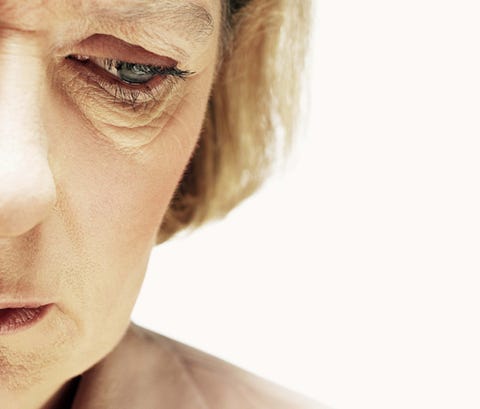Can I Take Anything for Diarrhea While Pregnant
If you're running for the restroom on a semi-regular basis, you're not battling a case of the stomach flu. Loose bowels that last more than a couple of days or occur every few days are most likely caused by something your body can't beat without some extra help. (Just so we're clear, if you have severe abdominal cramping, blood in your stool, or persistent diarrhea that lasts more than two weeks, you should see a doctor right away to rule out serious trouble such as colon cancer or chronic conditions like Crohn's disease.)
Here, six surprising causes of diarrhea—and how to get rid of the runs, stat.
Your mood

John Slater/Getty Images
Folks who are anxious or depressed are more likely to suffer from chronic diarrhea, according to a 2013 Chinese study published in the Journal of Experimental and Therapeutic Medicine. "There's a big connection between brain fibers and gut fibers—the same serotonin receptors line both of them," explains Gina Sam, MD, a gastroenterologist at the Mount Sinai School of Medicine. "If your serotonin levels are low because you're depressed, then that's also going to affect your gut as well." In addition, your body is secreting more of the stress hormone cortisol, which speeds up all your bodily functions, including your digestion. The good news is that some of the same meds you'd take to treat anxiety or depression—like Prozac—can also be used to treat irritable bowel, says Sam.
MORE: 7 Things Only People With Anxiety Would Understand
Your erratic sleep habits
Nurses with rotating shift schedules are more likely to experience irritable bowel syndrome, a condition that causes diarrhea, according to a 2010 University of Michigan study. "The changing schedule affects your circadian rhythms, and your gut can get confused since your internal clock is constantly resetting," explains Sam. When your body doesn't know when to go, the result can be the runs. Ditto with simply not getting enough sleep—if you're exhausted, your body secretes more cortisol, which once again can speed things up. Try to not only get 7 to 8 hours of sleep every night, but to go to bed and wake up at roughly at the same time every day. Your gut will thank you.
If you know you'll be losing sleep from travelling across time zones, consider taking a melatonin supplement (roughly 3 mg at bedtime): Studies show the hormone can help regulate both your body clock and lessen IBS symptoms.
Your addiction to sugar-free gum
Whenever you see the words "sugar free" on a food label, it may contain sorbitol, a type of sugar alcohol that can cause diarrhea, says Sam. It's also found in fruits such as apples, apricots, pears, nectarines, and plums. You don't have to cut these foods out completely, but try to keep consumption under 5 grams a day: a stick of sugar-free chewing gum, for example, contains 1 to 2 grams, while a serving of dried apricots and peaches has about 5 grams per serving. (Consider switching to one of these 8 best chewing gums that aren't packed with sketchy chemicals.)
Fibromyalgia
Studies estimate that 30% to 70% of people with this condition—a disorder that causes muscle pain and fatigue—also have IBS symptoms such as diarrhea. "We often see it in patients—we're not sure why, but one theory is the nervous system of fibromyalgia patients is simply more sensitive, which means the nerve cells in the digestive tract are also more sensitive," says Sam. There are drugs available to treat both conditions, includinganticonvulsant drugs such as Gabapentin, antidepressants,as well as cognitive behavioral therapy.
MORE: 10 Most Painful Conditions
Your Cross Fit class

Thomas Barwick/Getty Images
About half of all competitive athletes report GI symptoms such as diarrhea, reveals a research review published in the journal Current Opinion in Clinical Nutrition and Metabolic Care. But the phenomenon can happen to us mere mortals too: "If you're working out intensely, your body diverts blood supply from your gut to your muscles, which can cause cramping and diarrhea," explains Sam. If you don't want to spend your next 5K fun run racing to the porta potties, drink plenty of fluids both before and during the activity, and avoid caffeine, high-fat or high-fiber foods for up to 6 hours before your workout. If these steps don't reduce bathroom breaks—or you have the runs even with moderate activity—see your doctor to rule out a condition such as irritable bowel syndrome.
MORE: 9 Highly Effective Solutions For An Unhappy Stomach
A previous GI bug
You go to Mexico and come down with Montezuma's Revenge, get better, and then a few weeks later your symptoms return. What gives? This is a condition known as post infectious IBS, where residual inflammation after a bacterial GI infection (such as Salmonella or Campylobacter) causes increased gut movement, explains Sam. About 10% of people who suffer bacteria gastroenteritis end up with IBS, according to the International Foundation for Functional Gastrointestinal Disorders. In about 50% of patients, the problem resolves on its own; the others will need to take meds specifically tailored to IBS, such as a low-dose antidepressant.
Hallie Levine Hallie Levine is a freelance writer who has written about health and fitness for more than 20 national publications, including Glamour, Newsweek, and the New York Post.
This content is created and maintained by a third party, and imported onto this page to help users provide their email addresses. You may be able to find more information about this and similar content at piano.io
Can I Take Anything for Diarrhea While Pregnant
Source: https://www.prevention.com/health/a20458486/causes-of-diarrhea/
0 Response to "Can I Take Anything for Diarrhea While Pregnant"
Post a Comment